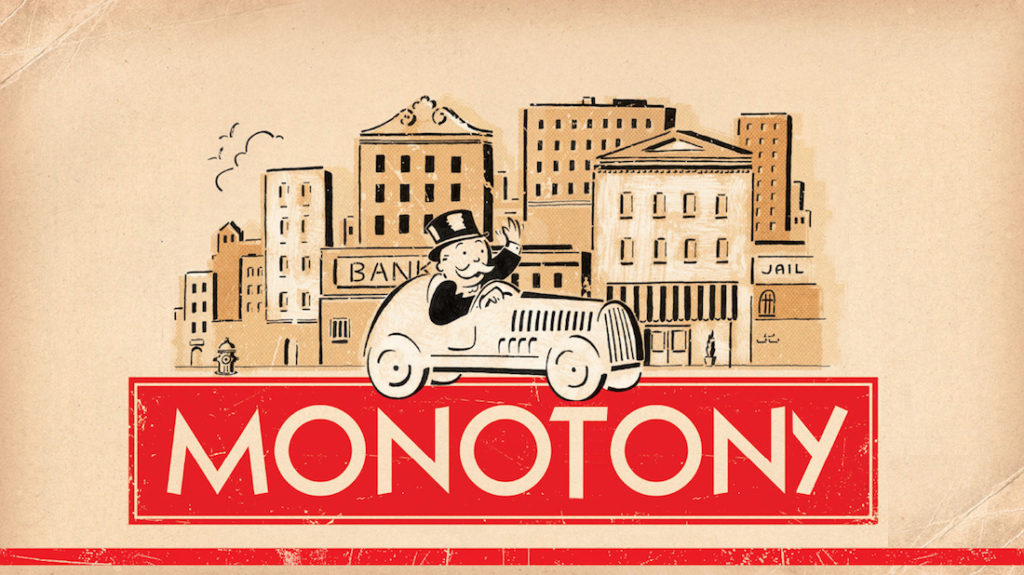
Old School – New School!
September 12, 2018 by Joe
 Here at GNG, we’re not overly keen on the big three traditional family board games: Monopoly, Cluedo and Risk. It’s a curious thing – the memory of playing board games as a kid can be a big part of what appeals when you pick them up as an adult, and yet most actual memories of playing Monopoly, for instance, are not good ones. Monopoly and Risk can seem hugely spiteful and unfair, and Cluedo is hampered by the drawn-out process of rolling a dice to move from room to room – if the game idea involved some sort of rift in the space-time continuum, the lurching walk-crawl-plod agony of getting around might make thematic sense. But it would still be excrutiatingly dull.
Here at GNG, we’re not overly keen on the big three traditional family board games: Monopoly, Cluedo and Risk. It’s a curious thing – the memory of playing board games as a kid can be a big part of what appeals when you pick them up as an adult, and yet most actual memories of playing Monopoly, for instance, are not good ones. Monopoly and Risk can seem hugely spiteful and unfair, and Cluedo is hampered by the drawn-out process of rolling a dice to move from room to room – if the game idea involved some sort of rift in the space-time continuum, the lurching walk-crawl-plod agony of getting around might make thematic sense. But it would still be excrutiatingly dull.
In fact, the ‘roll and move’ gameplay of Monopoly, Cluedo and a host of other similar games from the last century have made that phrase a pejorative, although there are a few modern games that use dice for movement and aren’t completely awful.
That said, the big three are the games most of us grew up playing – and many of us rediscover board games as an adult with those in mind. So here are a few modern alternatives, games that might just capture the essence of those glorious long, tortuous Sunday afternoons, without the long tortuous bit. I’ve limited it to five for each, but look up those games and you may find still more recommendations within each entry.
MONOPOLY-LIKE
If you pine for a spot of residential or commercial empire-building, but want to keep your friends, why not try:
CLUEDO-ESQUE
If sleuthing and deduction is your bag, but you’d rather do it at more than a jittery snail’s pace, here are five games that might float your boat:
RISK-AVERSE
If world domination is what you hanker after, but don’t have all day and would like a little variety:
ROLL & MOVE DONE RIGHT
And finally, if you feel a board game really isn’t a board game unless you get to roll dice and move that many spaces, here’s a few that take the jaundiced ‘roll and move’ action and breathe fresh life in to it . . .
MONOPOLY-LIKE
-
Catan feels like a classic board game of old – not always in a good way. It can sometimes outstay its welcome, and leave one player feeling they simply haven’t a chance to catch up. But the trading especially feels instantly familiar and intuitive – it’s that I think that puts me in mind of Monopoly (that and the little wooden houses, obviously). Catan’s the game that launched a thousand others, and definitely deserves a look.
-
Chinatown is sort of Monopoly boiled down to its essence – strip away the dice-rolling and special cards and just let the players shout at each other and do deals, and grow their tea-houses, dim sum joints and camera shops over seven rounds. Then see who has the most money. A great game with very simple rules.
-
Acquire is almost as old as Monopoly – like, 1960s old. It’s all about buying shares in businesses and merging them to maximise your profits and minimise your opponents – it’s a fairly mathematical game, and looks as dry as it probably sounds. For all that it’s a solid, clever game that wears its age extremely well.
-
Lords of Vegas is one of my very favourite games. With very simple mechanics, players build, expand and take over casinos in ’50s Las Vegas, and gamble their way to big, big payouts. A brilliant game which will inevitably end in stand up dice rolls, with everyone poised to cheer or wail at the results.
-
I’m the Boss is a raucous negotiation game, where deals are struck, then scuppered, then struck again. It’s brash, lurid and very back-stabby, but feelings will only get hurt within the ‘magic circle’ of the game – players will still be talking to each other afterwards.
Cluedo-esque
-
Mystery of the Abbey is a sort of Cluedo meets Name of the Rose mash-up, as cowled monks prowl the abbey (at a consistent pace, at least) for clues to the killer’s identity. There’s a touch of Guess Who? in there too, for serious retro-gamer types.
-
Mysterium is very much the same premise as Cluedo, but with a twist – one player is the ghost of the victim, communicating non-verbally with the other players to try and help them discover the details of the crime before time runs out. If your players are already fans of Cluedo, it might take them a go to get used to the cooperative nature of Mysterium – and being the ghost can be a stressful business; but this is a very accessible and clever game.
-
Mr Jack is a brilliantly tense game of cat and mouse for two players, one of whom is Jack the Ripper in disguise, another the investigator bent on unmasking him before time runs out, or he escapes the city. It’s a very clever game once both players are up to speed.
-
As with all of the above, the theme here is murder – but this time, the players’ ears will be used to track down the culprit. The game requires players to deduce which floor of the cardboard hotel their opponents cubes have landed on by listening. Cubes represent evidence, and at the end of the game, the player with the least evidence against them wins. Possibly not the most watertight game thematically, but a unique and clever experience.
-
The Resistance is one of many popular ‘social deduction’ games, a genre made popular by Werewolves, AKA Mafia, in which players try to discover who amongst them are the traitors. There are several big board games that include a similar idea, but the Resistance does a brilliant job with a relatively simple set-up.
Risk averse
-
This shares a similar rule-set to Wallenstein, and both utilise a rarely-seen piece of gaming brilliance: the cube tower! Cubes are used to represent forces, and battles are resolved by chucking cubes in to the tower and seeing what comes out. Cubes that remain inside might come to your rescue during a later battle.
-
Ascending Empires is a fast-paced game of exploring and colonising a far-flung galaxy, whilst fighting off your rivals in tense space battles. The big twist here is that you move your ships by flicking them across open space, either to fall into the orbit of planets, or get close enough to rivals to annihilate them. If you’re no good at flicking you can make headway in other areas, but a steady hand helps.
-
This is World War II from an interesting angle – the axis and allied powers fight it out automatically (no dice-rolling to see who wins), but you have to ensure the chain of supply keeps them able to do so. If you have six players you can play a team game, with Germany, Japan and Italy against GB, US and Russia. The rules are very straightforward, and the game plays in a tidy 90 mins or less.
-
Eclipse is a full-on epic of space colonisation and discovery, which inevitably builds towards a final epic battle. Like Ascending Empires, a large part of the game involves discovering and improving your available technology, giving these games a feel of civilisation computer games.
Eclipse has no flicking, but makes up for that with an epic narrative arc. -
The combination of card-play and dice-rolling give this Napoleonic-era 2 player war game a Risk-like feel, though here you’re fighting a single battle rather than all-out war. It’s a brilliantly clever design – easy to learn, fantastically tense and hugely replayable – one of my all-time favourites. If you enjoy chess but wish it had dice and hill-top redoubts, this game’s for you.
Roll and Move done right
-
It looks so easy – dance your pieces around the board until Hugo the ghost arrives, then escape into the nearest room. In practice, Hugo will catch you and ruin your score. Somehow, this just works. It works so well we’re banned from playing it in several venues because of the screaming.
-
Race your characters around a plain track – first to space 30 wins. How could this possibly be fun? And yet it is – each character has a simple power which turns each race into an unpredictable riot. It’s even possible to find yourself caught in an infinite loop, but don’t worry, the rules have it covered.
-
No board here, just a path of tiles to the finish line – but it’s not a race game. Roll the die and move one of your pawns, but if it leaves a tile empty of pawns you have to take the tile (which could be score you positive or negative points). This is more abstract than the other roll & move games here, but possibly a little more strategic, and still a lot of fun.
-
This breaks the roll & move rule slightly – you move a certain number of spaces each turn, then roll to have an encounter; but the spirit is there. Tales of the Arabian Nights is really a choose-your-own-adventure game disguised as a board game, but for the right group it’s a splendid story-telling tool, and a unique table-top experience.

Joe’s gaming hobby/passion/obsession began with Sam introducing him to Catan in 2007.
He plays mostly with gamer friends, but occasionally with his uncompromising teeenage daughters.
Joe loves trick-taking card games, push your luck and occasional war games.
When not playing, he loves to hunt for board game treasure in charity shops.
